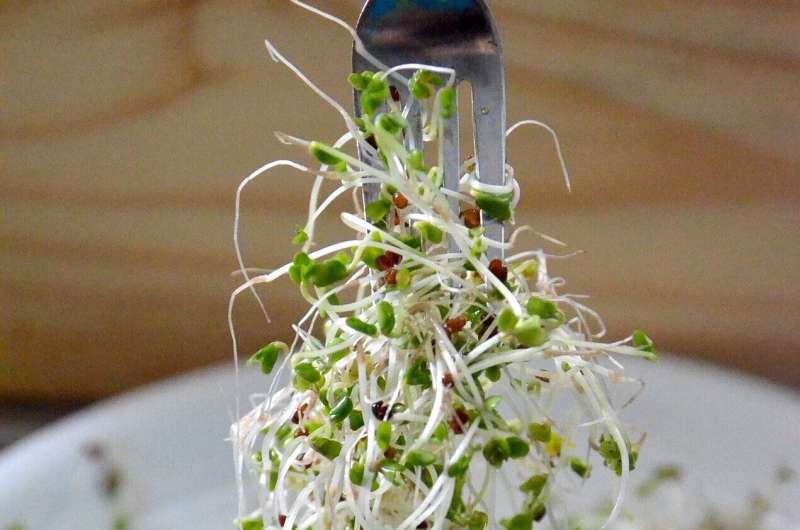This article has been reviewed according to Science X's editorial process and policies. Editors have highlighted the following attributes while ensuring the content's credibility:
fact-checked
trusted source
proofread
Early life exposure to broccoli sprouts may protect against colitis in inflammatory bowel disease

High fiber diets, like those that include broccoli sprouts or other cruciferous vegetables, may reduce disease symptoms and improve quality of life in patients with inflammatory bowel disease (IBD), according to a study conducted in mice. The study was published in mSystems.
In the study, the investigators used a popular interleukin-10-knockout (IL-10-KO) mouse model of Crohn's to investigate the interactions between mice and their immune systems, as well as the broccoli sprout diet, microbes within the Crohn's-afflicted gut, and how those microbes would use an inactive compound in the broccoli sprouts to make an anti-inflammatory compound in the gut. They also wanted to determine if, and by how much, a diet containing broccoli sprouts alleviates Crohn's symptoms, given the anti-inflammatory metabolites innately present in the sprouts.
The researchers used four groups of IL-10-KO mice in the study. In the first round, they had younger mice enrolled at four weeks of age who ate their standard mouse chow the whole time, as well as mice who ate the mouse chow with raw broccoli sprouts mixed in.
In the second round, they had the same two diet groups, but mice were enrolled at seven weeks of age. The researchers were particularly interested in understanding the development of IBDs in early life, which is why they studied the Crohn's mouse models at the juvenile stage (four to six weeks old) and at the adolescence stage (seven to nine weeks old) with hopes to better understand how host-diet-microbial community interactions and disease severity differ by age.
The mice were fed for seven days to acclimate to their respective diets before the researchers triggered symptoms, and the mice stayed on their diets for the following two weeks while the disease progressed.
To trigger symptoms, new healthy mice that host more microbes were added to the cage. Since the IL-10-KO mice in the study can't produce IL-10, their immune systems have trouble tolerating gut microbiota, and the new microbes in the cage triggered colitis and Crohn's symptoms.
For the next 15–16 days after infection, the researchers regularly weighed the mice and collected fecal samples to assess for signs of colitis development.
At the end of the study, the researchers examined the gut tissues of the euthanized mice and microbial communities present throughout their intestines, as well as the presence of certain markers of inflammation and broccoli metabolites in the blood. The researchers wanted to know what types of microbes were living in particular parts of the gut. In other words, they wanted to understand how the broccoli sprout diet affected microbial biogeography in the Crohn's models, since they cannot study this in humans.
DNA was extracted from the intestinal tissue samples collected from the mice and sent for sequencing to identify the bacteria present. Once the sequencing data was returned, the researchers used bioinformatics software and human ingenuity to study the gut microbial ecology of our mouse models.
"We found many exciting results from this study. First, we show that the mice that ate the broccoli sprout diet had a greater concentration of an anti-inflammatory metabolite called sulforaphane in their blood. Even though our mice were immunocompromised and had colitis, this increase in sulforaphane protected them from severe disease symptoms like weight loss, fecal blood and diarrhea," said Lola Holcomb, lead author and a Ph.D. Candidate in the Graduate School of Biomedical Sciences and Engineering at the University of Maine.
Lola is a member of a lab led by Suzanne Ishaq, Ph.D., a corresponding study author and assistant professor of animal and veterinary sciences at the University of Maine, School of Food and Agriculture, Orono, Maine.
Interestingly, the researchers found that the younger group of mice, the juveniles, responded better to the broccoli sprout diet than their adolescent counterparts did. The younger mice had milder disease symptoms and richer gut microbial communities. Furthermore, the younger mice showed stronger bacterial community similarity to each other (aka, stronger beta-diversity), and stronger adherence to location-specific community composition throughout different parts of the gut.
"Simply put, we found that of the four groups we studied, the younger mice fed a broccoli sprout diet had the mildest disease symptoms and the most robust gut microbiota," Holcomb said.
The researchers say that broccoli sprouts, which are easily grown and found in grocery stores, could be used as a treatment strategy for patients with IBD.
More information: Lola Holcomb et al, mSystems (2023). DOI: 10.1128/msystems.00688-23. journals.asm.org/doi/10.1128/msystems.00688-23




















